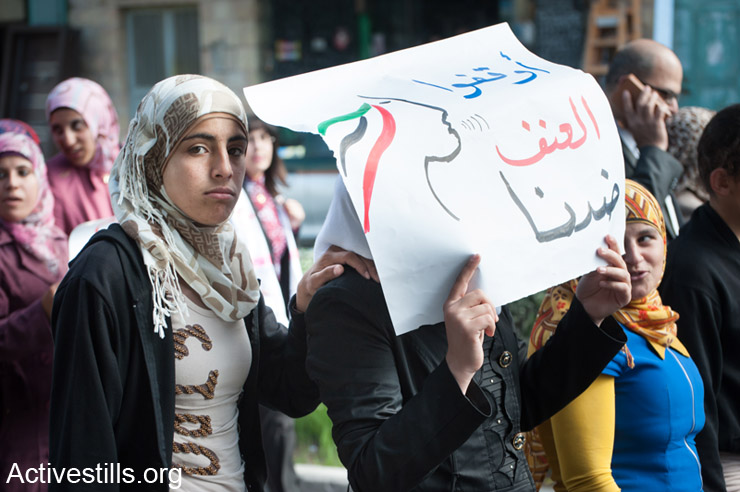How is it that Israel, a state with substantial arms exports, and which demands tight global scrutiny of the weapons purchased by its neighbors, has not signed a UN treaty to reduce violence against women and children?
By Smadar Ben-Natan (translated from Hebrew by Ofer Neiman)
The Knesset Committee for Advancement of the Status of Women is about to discuss a national action plan, initiated by a wide coalition of feminist NGOs, for the implementation of UN Security Council resolution 1325. The resolution calls for the adoption of a gender perspective in peace and security issues, or simply put – for the consideration of women’s special security needs, and of the unique nature of harm they suffer. For the first time, the national action plan includes a reference to the connection between violence against women and the proliferation of small arms and light weapons (SALW), viewing the reduced presence of such weapons in the public sphere as a means to minimize and prevent violence against women.
This recommendation joins a reform program started by the Public Security Ministry last August, which has resulted in a drop of almost half in the number of armed security guards. In addition, in most cases, armed guards are no longer allowed to take their weapons home. The reform aims to reduce the number of weapons in the public sphere and prevent lethal violence of the type inflicted in past on both women and men, relatives and intimates of security guards.
The realization that the presence of small arms in family settings endangers women in particular is gradually taking root throughout the world. Six months ago, the UN Security Council passed resolution 2117, dealing with restrictions on the proliferation of small arms, calling on all relevant organs to take into consideration the specific effects of this phenomenon on women. The resolution also calls for women’s participation in policymaking, planning and implementing disarmament and security sector reform, for instance, by encouraging the involvement of women’s organizations.

The resolution also mentions the Arms Trade Treaty (ATT), adopted last April by the UN General Assembly. This treaty creates an unprecedented link between the arms trade and potential violations of both human rights and international humanitarian law. It forbids signatory states to approve exports and arms transfers when they stand to be used in war crimes, severe human rights violations or acts of terror or organized crime, as indicated by a special mechanism established for this purpose. The treaty also explicitly stipulates that a state must examine whether weapons it exports may be used for acts of violence against women and children, or specifically, for gender based violence. If such a risk exists, the treaty obliges the state in question to refrain from exporting arms.
One hundred and fifteen states have already signed the new treaty, including France, Germany, Japan, the UK, Turkey and the U.S. – all states with significant security industries; eight states have already ratified it. The state of Israel, however, has not yet signed the treaty. The following question should be directed to officials in the Foreign Ministry and Prime Minister’s Office: how is it that a state with such substantial arms exports, which demands such tight global scrutiny of the weapons purchased and held by its neighbors, has not signed the Arms Trade Treaty.
The UN Security Council resolution and the Arms Trade Treaty indicate an accelerating process by which violence against women is no longer perceived as “merely” a domestic or family affair but, rather, as a national and global issue. Action toward preventing violence against women is mainstreamed into all relevant aspects of life and all fields of UN activity, first and foremost into peace-building and ensuring human security.
Human rights discourse and peace and security discourse, which sometimes seem to move in parallel tracks, are gradually forming intersections. Thus, the defense of human rights is taking root even in fields formerly regarded as distant and disconnected, such as the arms trade, disarmament and oversight of arms and weapons. Action toward preventing violence against women is no longer confined to the ‘pink ghetto’ of institutions dedicated exclusively to equality and to the protection of women. Instead, the idea is being instilled throughout society, permeating culture and becoming an integral part of policymaking in all fields.
Revolutionary measures have been taken this year in Israel – and worldwide – on issues of arms proliferation, arms trade and monitoring arms. Translating this conceptual change into concrete local measures, such as the reform begun by the Public Security Ministry, a reform in need of further reinforcement, is precisely the way to produce real results in the struggle to free growing numbers of women from the threatening presence of small arms and to prevent the severe harm these weapons cause too many women.
The writer is one of the founders of the “Gun Free Kitchen Tables” campaign, which seeks to reduce small arms proliferation in Israel and increase oversight of arms and weapons.
Read more:
WATCH: Arab women protest against domestic violence in Israel
PHOTOS: Protesters demand an end to ‘rape culture’ in Tel Aviv
